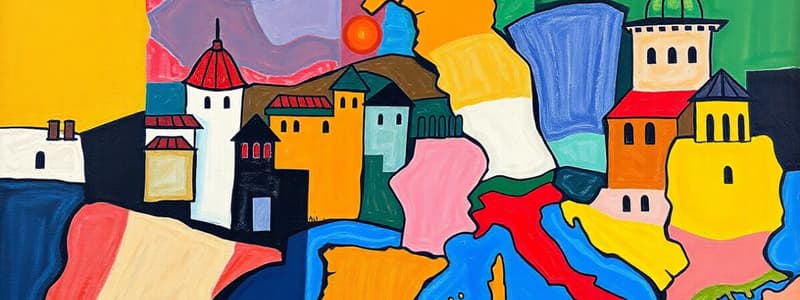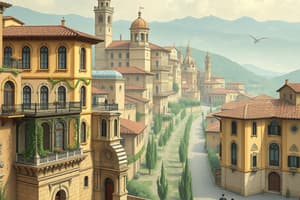Podcast
Questions and Answers
What factor contributed significantly to the wealth of the Italian city-states in the 1400s?
What factor contributed significantly to the wealth of the Italian city-states in the 1400s?
- Manufacturing of everyday goods
- Agricultural exports to Asia
- Mining of precious metals
- Control of trade connections (correct)
Which city-state is noted for its prominence in banking and trade by the end of the 1400s?
Which city-state is noted for its prominence in banking and trade by the end of the 1400s?
- Venice
- Florence (correct)
- Milan
- Rome
What was the primary role of Venetian merchants during the rise of city-states?
What was the primary role of Venetian merchants during the rise of city-states?
- Building walled towns
- Farming and agriculture
- Control of a coastal trading empire (correct)
- Military expansion
Which of the following statements accurately reflects the political situation in Italy during the 1300s?
Which of the following statements accurately reflects the political situation in Italy during the 1300s?
What was a significant outcome of the Popes returning to govern Rome?
What was a significant outcome of the Popes returning to govern Rome?
Which major city-state allied with France to exert control over northern and central Italy?
Which major city-state allied with France to exert control over northern and central Italy?
In the context of Italian city-states, what function did guilds serve?
In the context of Italian city-states, what function did guilds serve?
Which region surrounding the city-states was essential for producing goods like olives, grapes, and wheat?
Which region surrounding the city-states was essential for producing goods like olives, grapes, and wheat?
What was the significance of Italian scholars traveling to Christian monasteries and Muslim cities?
What was the significance of Italian scholars traveling to Christian monasteries and Muslim cities?
What influence did Giotto have on Renaissance painting?
What influence did Giotto have on Renaissance painting?
What was a major change introduced by Gutenberg's printing press?
What was a major change introduced by Gutenberg's printing press?
Which of the following goods was highly valued by wealthy Italians during this period?
Which of the following goods was highly valued by wealthy Italians during this period?
What change did the arrival of the printing press bring to literature in Europe?
What change did the arrival of the printing press bring to literature in Europe?
What was the primary method of book production before Gutenberg's printing press?
What was the primary method of book production before Gutenberg's printing press?
What did the ornamental features of the Gutenberg Bible reflect?
What did the ornamental features of the Gutenberg Bible reflect?
What was the main subject matter of classical texts sought by Italian scholars?
What was the main subject matter of classical texts sought by Italian scholars?
How did the introduction of printing presses affect literacy rates in Europe?
How did the introduction of printing presses affect literacy rates in Europe?
What did the hand-knotted carpets often represent for their owners?
What did the hand-knotted carpets often represent for their owners?
What was the primary factor that allowed the Medici family to gain power in Florence?
What was the primary factor that allowed the Medici family to gain power in Florence?
Which invention did Filippo Brunelleschi propose to aid in the construction of the dome?
Which invention did Filippo Brunelleschi propose to aid in the construction of the dome?
How did the plague impact Florence's population?
How did the plague impact Florence's population?
What is the Italian term for the cathedral of Florence?
What is the Italian term for the cathedral of Florence?
What architectural feature characterizes the dome completed in 1436?
What architectural feature characterizes the dome completed in 1436?
What role did Cosimo de Medici play in Florence after taking power in 1434?
What role did Cosimo de Medici play in Florence after taking power in 1434?
What major cultural movement is associated with Italy during the 14th and 15th centuries?
What major cultural movement is associated with Italy during the 14th and 15th centuries?
What did the architectural competition for the dome reveal about the city of Florence?
What did the architectural competition for the dome reveal about the city of Florence?
What led to the decline of guild power in Florence after the plague?
What led to the decline of guild power in Florence after the plague?
Which family member is known as 'the Magnificent' for his patronage of arts and learning?
Which family member is known as 'the Magnificent' for his patronage of arts and learning?
What significant influence did the Medici family have on Florence's cultural landscape?
What significant influence did the Medici family have on Florence's cultural landscape?
What geographical areas bordered Florence, as mentioned in the content?
What geographical areas bordered Florence, as mentioned in the content?
What was a consequence of Florence's lack of a ruling dynasty?
What was a consequence of Florence's lack of a ruling dynasty?
What was one of the major contributions of the Renaissance to Europe?
What was one of the major contributions of the Renaissance to Europe?
Flashcards
City-State
City-State
A wealthy and independent political entity that controlled a city and its surrounding territory.
Renaissance
Renaissance
A period of great cultural and intellectual flourishing in Europe, beginning in the 14th century.
Banking
Banking
The practice of lending money and charging interest, a key factor in the wealth of Italian city-states.
Guilds
Guilds
Signup and view all the flashcards
Trade Connections
Trade Connections
Signup and view all the flashcards
Bazaars
Bazaars
Signup and view all the flashcards
Florence
Florence
Signup and view all the flashcards
Republic
Republic
Signup and view all the flashcards
Italian Renaissance
Italian Renaissance
Signup and view all the flashcards
Classical Revival
Classical Revival
Signup and view all the flashcards
Commission
Commission
Signup and view all the flashcards
Woodblock Printing
Woodblock Printing
Signup and view all the flashcards
Metal Type Printing
Metal Type Printing
Signup and view all the flashcards
Gutenberg Bible
Gutenberg Bible
Signup and view all the flashcards
Vernacular Languages
Vernacular Languages
Signup and view all the flashcards
Printing Workshop
Printing Workshop
Signup and view all the flashcards
Access to Knowledge
Access to Knowledge
Signup and view all the flashcards
Revolution in Print
Revolution in Print
Signup and view all the flashcards
Apprentices
Apprentices
Signup and view all the flashcards
Active Participation in Government
Active Participation in Government
Signup and view all the flashcards
Florence's Cathedral
Florence's Cathedral
Signup and view all the flashcards
The Plague
The Plague
Signup and view all the flashcards
The Dome
The Dome
Signup and view all the flashcards
The Dome Competition
The Dome Competition
Signup and view all the flashcards
Filippo Brunelleschi
Filippo Brunelleschi
Signup and view all the flashcards
Structures Representing City Identity
Structures Representing City Identity
Signup and view all the flashcards
The Medici Family
The Medici Family
Signup and view all the flashcards
Patronage
Patronage
Signup and view all the flashcards
Cosimo de Medici
Cosimo de Medici
Signup and view all the flashcards
Lorenzo de Medici
Lorenzo de Medici
Signup and view all the flashcards
The Renaissance
The Renaissance
Signup and view all the flashcards
Mass Printing
Mass Printing
Signup and view all the flashcards
Study Notes
Italian City-States' Rise to Power
- Italian city-states, kingdoms, and papal territories were fragmented in the 1300s
- Conflicts arose over land, resources, and trade control
- Wealthy families contended for power
- City-states grew in size, power, and wealth, with Florence leading by the late 1400s
Expanding City-States
- 1300s Italy was violent and unstable; farmland surrounded walled towns and cities
- Cities raised armies for defense; vied for successful industries and resources
- Stronger cities controlled larger territories
- Italian merchants sustained trade with northern Europe, North Africa, and Asia
- Imports of luxury goods (carpets, gems, tulips, horses, dyes) increased from Muslim bazaars
Powerful City-States
- Venice, Milan, Rome, and Florence were key powerful city states
- Venice built a trading empire along the Mediterranean and Constantinople
- Milan, allied with France, took over parts of northern and central Italy
- Rome's popes, temporarily ousted, returned and rebuilt with new ideas and trade wealth
Florence's Prosperity
- Florence, a republic, was governed by guilds (e.g., lawyers, bankers, silk weavers had more power than stone masons)
- Guilds had workshops with apprentices; those who mastered could open their own workshops
- Florence relied on citizen participation for stability
Florence's Cathedral (Il Duomo)
- Florence's cathedral, under construction since 1296, was the largest structure in the region
- Plague in the mid-1300s devastated Italy and caused population loss in Florence
- The dome, 138 feet across at its base and 170 feet off the ground, posed engineering challenges
- Filippo Brunelleschi won a competition to build the Florence Cathedral's dome, designed with innovative machines (crane, hoist) in 1436
Medici Family
- The Medici family controlled Florence's wool manufacturing and banking
- Medici banks expanded (Venice, Rome, London)
- Medici family (Cosimo, Lorenzo), gained strong control of the government; Cosimo was a patron of artists and established a public library (first in Western Europe since ancient times).
- Lorenzo "the Magnificent" promoted arts and learning
- Despite Medici support some citizens were unhappy with the centralized ruling family
European Renaissance
- European Renaissance (1300s-1600s) had international roots
- Scholars in Córdoba, Baghdad, and Timbuktu translated classical Greek writings for centuries
- Italian scholars sought classical writings, even fragments, in Christian monasteries and Muslim libraries (Aristotle, Plato, Euclid, Ptolemy, Cicero)
- Italian interest grew in moral philosophy, art, and architecture based on ancient models
- Trade from Asian cities brought intricate ceramics and silks to Venice and other Italian cities
The Printed Word
- China and Korea had used woodblock printing and movable type early
- Spanish Muslims first in Europe used ancient Chinese papermaking techniques
- Johannes Gutenberg (German inventor) developed and improved printing presses in the 1400s (metal type, quick copies)
- Gutenberg Bible (Latin): 1,286 pages, about 42 lines per page, and ornate hand-painted illustrations, was remarkable and printed on more affordable metal presses in Europe.
Impact of Printing
- Printing presses arrived in Italy in 1465
- By 1500, 73 printing shops operated in Italy, producing books in vernacular languages (vs. Latin). This greater access to books helped promote literacy and the study of these languages for many citizens in Europe.
- Communication and learning in Europe expanded greatly.
Studying That Suits You
Use AI to generate personalized quizzes and flashcards to suit your learning preferences.




